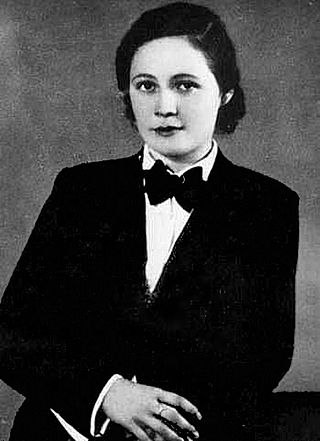Top Qs
Timeline
Chat
Perspective
Vítězslava Kaprálová
Czech composer and conductor (1915–1940) From Wikipedia, the free encyclopedia
Remove ads
Vítězslava Kaprálová (Czech pronunciation: [ˈvi:cɛslava ˈkapra:lova:]; 24 January 1915 – 16 June 1940) was a Czech composer and conductor of 20th-century classical music.
Remove ads
Life and career
Summarize
Perspective
Vítězslava Kaprálová was born in Brno, Austro-Hungarian Empire (now Czech Republic), a daughter of composer Václav Kaprál and singer Vítězslava Kaprálová (née Viktorie Uhlířová).[1] From 1930 to 1935 she studied composition with Vilém Petrželka and conducting with Zdeněk Chalabala at the Brno Conservatory. She continued her musical education with Vítězslav Novák (1935–37) and Václav Talich (1935–36) in Prague and with Bohuslav Martinů, Charles Munch (1937–39) and, according to some unverified accounts, with Nadia Boulanger (1940) in Paris.[2] [3] In 1937 she conducted the Czech Philharmonic and a year later the BBC Orchestra in her composition Military Sinfonietta. Her husband was the Czech writer Jiří Mucha, whom she married two months before she died.[2] [3]
Despite her untimely death, which may have been caused by typhoid fever,[4] in Montpellier, France at the age of 25, Kaprálová created an impressive body of work.[5] [6] Her music was admired by Rafael Kubelík, who premiered her orchestral song Waving Farewell and also conducted her other orchestral works. Among the many interpreters of her piano music was pianist Rudolf Firkušný, for whom Kaprálová composed her best known piano work Dubnová preludia (April Preludes). In 1946, in appreciation of her distinctive contribution, the foremost academic institution in the country—the Czech Academy of Sciences and the Arts - awarded Kaprálová membership in memoriam. By 1948 this honour was bestowed on only 10 women, out of 648 members of the Academy.[7]
The only English language monograph on the composer was published in 2011 by Lexington Books in the United States. The book also includes an annotated catalog of her works.[3] Kaprálová was "Composer of the Week" on BBC Radio 3 from Monday 12 October to Friday 16 October 2015, a set of five one-hour programs playing her music and discussing her life.[8][9] In 2021, Kapralova was among the 58 personalities featured by the exhibition Portraits de France, organized under the auspices of Emmanuel Macron in Paris, from December 1, 2021 to February 14, 2022. The 29 women and 29 men made the final cut from the original 318 nominees to be commemorated and celebrated for their contribution to the "national narrative of France."[10]
Remove ads
Compositions
Kaprálová's catalogue includes her highly regarded art songs and music for piano solo, and a string quartet, a reed trio, music for cello, music for violin and piano, an orchestral cantata, two piano concertos, two orchestral suites, a sinfonietta, and a concertino for clarinet, violin, and orchestra. Much of her music was published during her lifetime and continues to be published today by various publishing houses, including Schott and Bärenreiter Verlag. In addition, her music has been released on record and compact disc by a variety of labels, including Chandos, Naxos, Koch International, Albany Records, Centaur Records, Delos Productions, Gramola, Claves Records, Supraphon, and many others.[11]
Remove ads
Legacy
The Kapralova Society
Kaprálová's legacy has been promoted by the Kapralova Society, a music society founded in 1998 in Toronto, Canada.[12][13] The society has been also seeking to redress the gender imbalance in classical music through public education and Kapralova Society Journal, "a journal of women in music".[14][15]
In popular culture
- Featured in Season 3, episodes 6 and 9, of the television series Mozart in the Jungle.[16]
- Featured in The Glass Room by Simon Mawer[17]
List of compositions
Selected works
- Suite en miniature, op. 1 for small orchestra
- Two Compositions for Violin and Piano, op. 3
- Two Songs, op. 4
- Song cycle Sparks from Ashes, op. 5
- January, for voice, flute, two violins, violoncello and piano
- Sonata Appassionata, op. 6 for piano
- Piano Concerto in D Minor, op. 7
- String Quartet, op. 8
- Grotesque Passacaglia for piano
- Three Piano Pieces, op. 9
- Song cycle Apple from the Lap, op. 10
- Sad Evening, for voice and large orchestra
- Military Sinfonietta, op. 11 for large orchestra
- Song cycle Forever, op. 12
- April Preludes, op. 13 for piano
- Waving Farewell, op. 14 for voice and piano / large orchestra
- Trio for Oboe, Clarinet, and Bassoon
- Ilena, op. 15. Cantata for soli, mixed choir, reciter and large orchestra
- Variations sur le carillon de l'église St-Étienne-du-Mont, op. 16 for piano
- Two Choruses for Women's Voices a cappella, op. 17
- Elegy, for violin and piano
- Suita Rustica, op. 19 for large orchestra
- Partita, op. 20 for strings and piano
- Concertino for Violin, Clarinet and Orchestra, op. 21
- Song cycle Sung into the Distance, op. 22
- Deux ritournelles, op. 25 for violoncello and piano
Remove ads
Selected discography
- Orchestral Works (Suite en miniature, Piano Concerto, Military Sinfonietta, Suita rustica, Partita) Vítězslava Kaprálová: The Completed Orchestral Works, 2CD, CPO 555 568-2
- Orchestral Music (Prélude de Noël, Suite en miniature, Military Sinfonietta, Piano Concerto, orchestral songs Waving Farewell and Sad Evening) Kaprálová: Orchestral music, CD, Naxos 8.574144
- Complete piano music La Vita: Leonie Karatas plays Vítězslava Kaprálová, CD, EuroArts 2069107
- Music for piano / piano and violin Vítězslava Kaprálová, CD, Koch Records KIC-CD-7742
- Art songs Forever Kaprálová: Songs, CD, Supraphon SU3752-2 231
- String quartet Kaprál-Kaprálová-Martinů, CD, Radioservis CRO618-2
Remove ads
Notes
References
Bibliography
External links
Wikiwand - on
Seamless Wikipedia browsing. On steroids.
Remove ads

